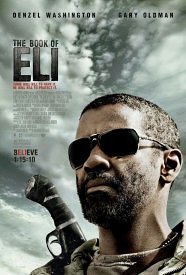 The Book Of Eli starts off like many other post-apocalyptic films. A lone protagonist moves through a blasted, oft-times monochromatic landscape, scavenging for whatever will help them survive for another day in this hellish world. Their journey is mostly silent, except for brief moments where they talk to themselves. Eli (Denzel Washington) is such a traveler, but we will learn that he has a mission that is just more than survival.
The Book Of Eli starts off like many other post-apocalyptic films. A lone protagonist moves through a blasted, oft-times monochromatic landscape, scavenging for whatever will help them survive for another day in this hellish world. Their journey is mostly silent, except for brief moments where they talk to themselves. Eli (Denzel Washington) is such a traveler, but we will learn that he has a mission that is just more than survival.
Once we get past this pro-forma beginning, The Book Of Eli does manage to distinguish itself by actually becoming a treatise on the power of religion to inspire hope in people and how that power of religion to inspire hope in people and how that power can be used or misused. Eli comes across a small town where others of the unspecified apocalypse scratch out a living. Ruling over the town is Carnegie (Gary Oldman), one of the few people old enough to have learned how to read before the collapse of civilization. (Anyone born after the cataclysm three decades prior hasn’t had too much time for schooling.) He is searching for a specific book which he believes can solidify his power base in the town and expand it out into the surrounding territory. It is no spoiler that the book in question is The Bible and Eli happens to be carrying one of the last copies known to exist. (Most were destroyed by the survivors of the left unexplained apocalypse.) Needless to say, Eli isn’t about to hand it over and leaves town in the company of the step-daughter that Carnegie pimps out (Mila Kunis) with Carnegie and his gang of thugs in pursuit.
Directors Albert and Allen Hughes do a good job in balancing the film’s action text against its thematic subtext. Many of the gun battles between Eli and his various opponents are stylishly done. There’s one such scene where the camera circles back and forth between Eli and a couple of other defenders in a house and Carnegie’s forces outside in what appears to be a seamless, continuous shot.
Washington and Oldman likewise do admirable jobs in allowing their characters to embody the film’s theme. Eli is a calm man trying his best to live by what he has read in the Bible, though in order to finish his mission to deliver the book westward, he will need to do something more proactive than turning the other cheek. Carnegie, on the other hand, simply sees the words in the Bible as a tool to manipulate people to his own ends. At once, the film is a critique of organized religion and an endorsement of the power of faith. An interesting mixture, given Hollywood’s general shying away from any religious these lest they offend potential ticket buyers. Screenwriter Gary Whitta manages to pull it off well, making this that very rare breed, a thinking man’s action film.
Unfortunately, The Book Of Eli stumbles right at the finish line, going on for about five minutes too long. The job that Eli set out to do is completed in an interesting, though not entirely unsurprising, way. But rather than fade to black and roll credits at this moment, the movie feels compelled to revisit some of the supporting characters one more time, to tie up each of their storylines in a nice neat bow, while we receive a final voiceover from Eli. The character resolutions are nothing unexpected and the movie already gives us enough to surmise what is in store for them without having to explicitly spell it out for us with these little codas. Additionally, Eli’s voiceover needlessly reiterates some inner workings of his own character that are implied through the final part of the story. It seems sadly ironic that a film about faith would suddenly loose its own in the audience in its final moments.




